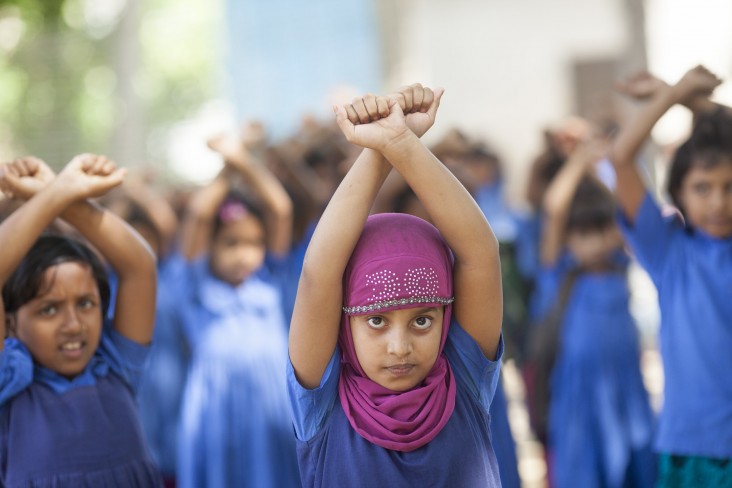Speeches Shim

Bangladesh, with more than 165 million residents, is the third-largest Muslim-majority and the eighth-most populous country. At the crossroads between South and Southeast Asia, the country could aid U.S. Indo-Pacific promotion of a free, open international system. Averaging more than six percent economic for more than a decade, Bangladesh is set for graduation from Least Developed Country status in 2024, underscoring the efficacy of $6 billion in USAID assistance provided since independence in 1971, but corruption, an inaccessible justice system, and concentrated authority hinder development.
Good governance and accountability are critical for economic growth, health, education, and high-quality public services. USAID democracy and governance activities enhance citizen confidence in government by strengthening democratic processes and civil society, increasing access to justice, protecting human rights, and providing development opportunities for youth. Establishing democratic, citizen-centered governance, based on rule of law, is essential to the Bangladesh journey to self-reliance. The activities integrate participation, inclusion, transparency, and accountability to support good governance.
Democratic Political Processes
The Awami League won a landslide victory in the 2018 parliamentary elections, marked by irregularities, leaving the Bangladesh Nationalist Party and the Jatiya Party with little political clout. The absence of a healthy opposition weakens the checks-and-balances needed for representative parliamentary democracy. USAID focuses on strengthening democratic processes within the three major political parties to develop the skills of youths, women, minorities, and facilitate cross-party engagement to mitigate political conflict.
USAID supports civil society and citizen participation, encouraging a more-inclusive, resilient, evidence-driven Bangladeshi civil society. USAID helps civil-society organizations advocate for human rights, social issues, and community concerns and encourages government responsiveness to citizens.
Promoting Good Governance and Transparency
USAID builds the capacity of civil society organizations to work in partnership and build trust with the Government of Bangladesh to advance good governance. USAID enables civil society to build coalitions with private sector, media and grassroots activists and effectively advocate for improved democratic governance that is responsive to the needs of citizens and makes community services available.
Human Rights and the Rule of Law
USAID trains government officials and CSOs to fight trafficking-in-persons (TIP), protect survivors, and effectively prosecute perpetrators. USAID activities reduce child marriage by raising awareness of the harm of child marriage and its link to reducing educational, social, and economic opportunities for girls.
USAID also supports Bangladeshis’ access to legal services, in partnership with legal aid-organizations, judges, judicial staff, and vulnerable groups. The National Legal Aid Services Organization and district legal-aid committees, aided by the USAID Promoting Peace and Justice project, form a bright spot in an otherwise dysfunctional justice system. USAID is exploring options to expand legal-aid support through CSOs, and law schools. USAID also works with government ministries and CSOs to increase women’s knowledge of their rights and access to information about education, health, and land rights.
Labor Rights
USAID labor programming promotes union organizing, labor-rights enforcement, access to justice for workers, and empowerment of women workers. It strengthens independent unions and supports development of community-based organizations serving workers and workers’ communities.
Supporting a Culture of Tolerance
USAID empowers local leaders, teachers, parents, and students to actively oppose violent extremism in their communities. USAID works to understand violence and extremism in Bangladesh through: research, citizen engagement, and government engagement.
Results
In 2019, USAID programs in Bangladesh:
- Provided political-process and election training to more than 40,000 political activists and future leaders, which helped 53 women join major-political leadership committees.
- Promoted notable gains in the RMG industry, including registration of 67 new labor unions advocating for more than 100,000 workers. These organizations support worker collective action in the workplace and improve labor conditions.
- Trained human-rights defenders and grassroots organizations in the Disability Rights and Protection Act (DRPA) 2013 to advocate for the disabled. This training led to a historic first filing and hearing from a person with disabilities by a district committee of a complaint for compensation under DRPA.
Shahara Khatun, 28, makes blazers in a factory in Gazipur, a district of Dhaka. With her income she supports her parents, husband and two sons. She had to leave the comfort of family in their home village 4 hours away, to find a job that could provide for them after her husband became ill and could no longer work to support the family. When she first started at the factory 7 years ago, conditions were rough. She did not get paid on time, she didn’t have paid leave, and they couldn’t talk to management to address problems. After joining a trade union supported by USAID, Shahara learned about workers’ rights and labor laws. Her union elected her as the general secretary and together they negotiated better working conditions at the factory. Now, they can discuss issues with management, they get paid on-time, they have daycare at the factory to keep their children, and they have scheduled leave. With her income, she supports her eldest son’s education and has bought a plot of land next to her parents’ house where she’ll build a new house for her family.
Learn more in our Medium post: Remembering the Workers of Rana Plaza


Comment
Make a general inquiry or suggest an improvement.